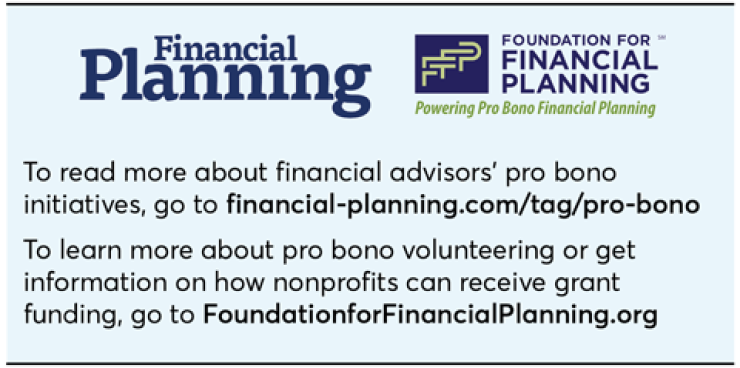At 2:30 a.m., Vita Iskandar and her partner drove away from their home in Santa Rosa, California, through a smoky haze as a nearby wildfire gathered unimaginable strength. By 4 a.m. a wall of fire hit the house they left behind. At 2 p.m. they drove back to find rubble where their house and entire neighborhood once stood.
"It was 'Leave It to Beaver' land," Iskandar recalls of their home of 14 years before the
The fire, one of numerous simultaneous blazes in Napa and Sonoma Counties, killed 22, leveled more than 5,000 homes and structures and left thousands of people temporarily homeless and facing a spinning kaleidoscope of planning questions.

Despite their tremendous loss, Iskandar and her partner were luckier than many — Iskandar’s partner, who owned the house, received a one-on-one pro bono financial planning session designed to help her decide whether to rebuild and to address related financial issues. In the past year, 20 volunteer advisors have taken about 130 pro bono meetings with fire survivors who lost their homes. Many volunteers are members of the FPA of San Francisco, which received a grant from the
"The majority of the folks we are serving in Sonoma have never met with a financial planner before," says Chris Remedios, founder of Remedios Financial Planning in San Francisco, who provided the planning session to Iskandar's partner. "Our Financial Planning Days in Sonoma have been a wonderful opportunity to provide our neighbors in need a taste of the benefits of working with a planner — and our planners
The benefits flow both ways: Volunteering also allows advisors to learn about complex topics such as minimizing tax hits related to rebuilding and navigating long negotiations and, in some cases, out-and-out fights, with insurers.

Given that the meetings are generally hourlong one-offs, planners can do only so much but even 60-minute sessions can give survivors space to think things through.
"To have any sort of impact on a small part of the [overall planning] question in a safe and hopefully competent atmosphere … is really, really appreciated," Iskandar says. After the planning session, she and her partner decided not to rebuild. They recently bought a home in nearby Sebastopol.
The key, according to Remedios, is to keep survivors moving forward so they don't get bogged down by the emotional and logistical challenges before them.
"Overall what's been consistent is that these folks are extremely stressed," she says. "If you talk to them for a couple of minutes, you get to an underlying layer of questions that they haven't expressed. Often there are tears."

Just deciding whether or not to rebuild can be maddeningly difficult, says Jesse Pence, head of the FPA of San Francisco's pro bono arm. Pence, who works for Waypoint Wealth Partners, has been volunteering alongside Remedios in Santa Rosa.
If survivors choose to return, the full cost of rebuilding is higher than most insurers fully foresaw, making it difficult to secure sufficient settlement funds, Pence says.
"There are so many considerations, so many things to juggle," says Iskandar, who runs a

While she and her partner have received partial insurance reimbursement for their loss, their claim remains open on several unresolved issues, Iskandar says.
Most people and their insurance agents "don't think about also losing foundations, driveways, all landscaping and other infrastructure such as septic [tanks]," Iskandar says.
For her neighbors who are rebuilding, other unexpected expenses include the cost of geotechnical reports, surveys, new construction engineering, architectural plans and conforming to California's updated building codes that come into play when the losses are so total that only dirt lots remain once the rubble has been cleared, she adds.
Many survivors, initially traumatized by the fire have been further traumatized as they have attempted to get insurance money to rebuild, Iskandar says.
Another couple that Remedios recently advised through the pro bono program had lived in their home on 30-plus acres for about 35 years, the planner says.
The night of the fire, the pair had only five minutes to flee. That gave the wife time enough to grab just one item from a front hall closet: the home's architectural plans.
The plans enabled them to get an estimate for a rebuild that would recover most of the expense. But because the couple had performed many of the upgrades to their residence themselves over the years, the tax basis on the property will be lower than if they had paid others to do it, Remedios says — presenting an unexpected hurdle.
-
Technology costs money and takes time, but the benefits are well worth it, Nina O’Neal writes.
December 11 -
When disaster struck, this tool helped Titus Wealth Management find affected clients in minutes.
November 1 -
When disaster struck, Titus Wealth Management used one tool to find all affected clients in 15 minutes.
November 21
Not having an increased tax basis for the renovations poses potential complications to the couple whether they stay or sell.
As the insurance negotiations continue, they are wondering if they should give up the rural life they love and move closer to their children in Sacramento, according to Remedios.
Although their single planning session didn't enable the couple to answer the big question of whether to stay or go, it did allow them to get a handle on the major issues at stake, Remedios says.
"We took that next step," Remedios says. "That's really all we do: just take that next step. If we do that, they're making progress."
Remedios, Pence and other FPA volunteers plan to keep making the weekend drive to Santa Rosa for future planning days, the dates of which Iskandar continues to post on her website.
"We plan to keep doing this work," Pence says, "as long as there is interest in the community."





